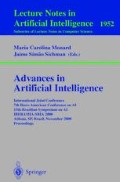Abstract
Iterated Function Systems are popular techniques for gene- rating selfsimilar fractals. An important practical problem in this field is that of obtaining the IFS code which approximates a given image with a certain prescribed accuracy (inverse IFS problem). In this paper we present an hybrid evolutive-genetic algorithm to solve the inverse IFS problem in two steps: First, an Evolutive Strategy (ES) is applied to identify a set of affine transformations associated with selfsimilar structures within the image. Then, the best adapted transformations are combined forming an initial population of IFS models and a Genetic Algorithm (GA) is used to find the optimal IFS model. We show that this hybrid algorithm performs significantly better than one-step global evolutive or genetic algorithms which have been recently reported in the literature.
Access this chapter
Tax calculation will be finalised at checkout
Purchases are for personal use only
Preview
Unable to display preview. Download preview PDF.
References
Turner, M.J. and Blackledge, J.M., Andrews, P.R.: Fractal Geometry in Digital Imaging. Academic Press, 1998.
Barnsley, M.F.: Fractals everywhere, second edition. Academic Press, 1990.
Fisher, Y.: Fractal Image Compression: Theory and Application. Springer Verlag, 1995.
Gutiérrez, J.M., Iglesias, A., Rodríguez, M.A. and Rodríguez, V.J.: Generating and Rendering Fractal Images. The Mathematica Journal 7(1), 6–14, 1997.
Vyrscay, E.R.: Moment and collage methods for the inverse problem of fractal construction with iterated function systems, In H.O. Peitgen et al. editors. Fractals in the Fundamental and Applied Sciences. Elsevier, 1991.
Abiko, T., Kawamata, M.: IFS coding of non-homogeneous fractal images using Gröbner basis. Proceedings of the IEEE International Conference on Image Processing (1999) 25–29.
Berkner, K.: A wavelet-based solution to the inverse problem for fractal interpolation functions, in L. Véhel et al. editors. Fractals in Engineering’97. Springer Verlag, 1997.
Michalewicz, Z.: Genetic Algorithms + Data Structures = Evolution Programs, second edition, Springer-Verlag, 1994.
Holland, J.H.: Adaptation in natural and artificial systems. The University o Michigan Press, 1975.
Goldberg, D.E.: Genetic Algorithms in Search, Optimization and Machine Learning, Addison Wesley, 1989.
Rechenberg, I.: Evolution strategie: Optimierung technischer systeme nach prinzipien der biologischen evolution. Frommann-Holzboog Verlag, 1973.
Lutton, E. et al.: Mixed IFS-resolution of the inverse problem using genetic programming. INRIA Rapport 2631, 1995.
Shonkwiler, R., Mendivil, F., Deliu, A.: Genetic algorithms for the 1-D fractal inverse problem. Proceedings of the Fourth International Conference on Genetic Algorithms, Morgan Kaufmann, 495–501, 1991.
Goentzel, B.: Fractal image compression with the genetic algorithm. Complexity International 1, 111–126, 1994.
Nettleton, D.J., Garigliano, R.: Evolutionary algorithms and a fractal inverse problem. Biosystems 33, 221–231, 1994.
Evans, A.K. and Turner, M.J.: Specialisation of evolutionary algorithms and data structures for the IFS inverse problem, in M.J. Turner editor. Proceedings of the Second IMA Conference on Image Processing: Mathematical Methods, Algorithms and Applications, 1998.
Klette, R., Zamperoni, P.: Measures of correspondence between binary patters. Image and Vision Computing 5 (1987) 287–295
Rooij, A.J., Jain, L.C.: Neural network training using genetic algorithms. World Scientific, 1998.
Author information
Authors and Affiliations
Editor information
Editors and Affiliations
Rights and permissions
Copyright information
© 2000 Springer-Verlag Berlin Heidelberg
About this paper
Cite this paper
Gutiérrez, J.M., Cofiño, A., Ivanissevich, M.L. (2000). An Hybrid Evolutive-Genetic Strategy for the Inverse Fractal Problem of IFS Models. In: Monard, M.C., Sichman, J.S. (eds) Advances in Artificial Intelligence. IBERAMIA SBIA 2000 2000. Lecture Notes in Computer Science(), vol 1952. Springer, Berlin, Heidelberg. https://doi.org/10.1007/3-540-44399-1_48
Download citation
DOI: https://doi.org/10.1007/3-540-44399-1_48
Publisher Name: Springer, Berlin, Heidelberg
Print ISBN: 978-3-540-41276-2
Online ISBN: 978-3-540-44399-5
eBook Packages: Springer Book Archive

